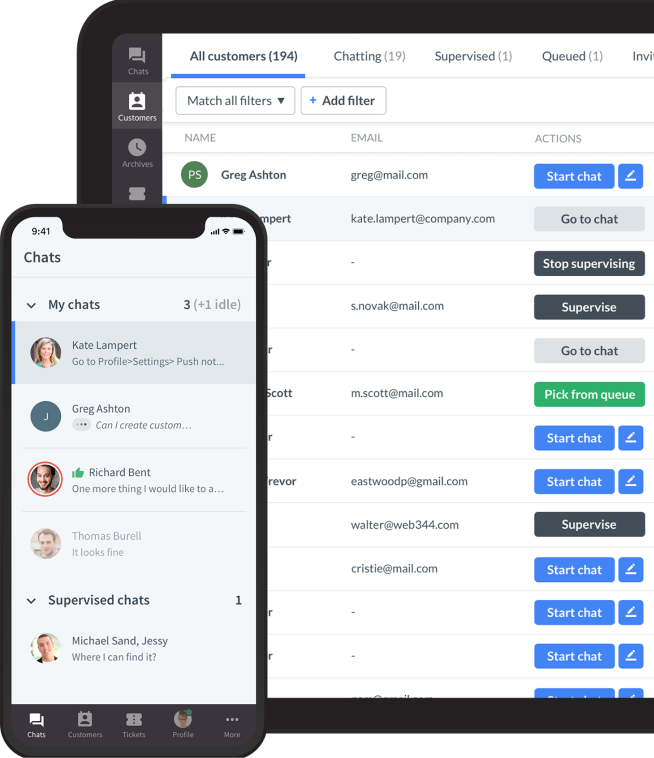Showing top 0 results 0 results found
Showing top 0 results 0 results found

In B2B sales, it all starts with lead generation – sparking conversations that truly matter. But what happens between those initial sparks and the final deal within the sales funnel? Let’s unravel the art of B2B sales.
B2B sales definition
B2B sales (business-to-business sales) is a specialized form of commerce where transactions occur between two businesses rather than between a company and individual consumers. This unique sales model focuses on meeting the needs of other companies, supplying them with products, services, or solutions to facilitate their operations, growth, or efficiency.
At its core, B2B sales involve the exchange of goods, services, or solutions from one business entity to another. Unlike B2C (business-to-consumer) transactions, where the end consumer is the target, B2B sales are characterized by the business entities being both the buyers and sellers. This intricate network of transactions forms the backbone of the global economy, driving industries across various sectors.
Nature of transactions
The nature of B2B sales is often more complex and nuanced compared to B2C. In B2B sales, decision-making involves multiple stakeholders, and purchases are typically based on long-term relationships, specific business needs, and a focus on value rather than impulse. The considerations extend beyond individual preferences to encompass the strategic goals and requirements of the business as a whole.
Diversity of industries
One notable aspect of B2B sales is its ubiquity across diverse industries. From manufacturing and technology to healthcare and finance, businesses across the spectrum engage in B2B transactions. This diversity highlights the adaptability of the B2B sales model, demonstrating its applicability in meeting the unique demands of different sectors.
The difference between B2B and B2C sales
B2B sales and B2C sales differ significantly in their target audiences and the nature of transactions. While B2B sales involve businesses selling to other companies, B2C sales are directed towards individual consumers. The fundamental distinction lies in the scale, complexity, and motivations behind these transactions.
Decision-making in B2B sales typically involves multiple stakeholders within the buyer's organization. These stakeholders may include executives, managers, and end-users, each contributing to the decision-making process. Unlike individual consumers in B2C sales, B2B customers are driven by the need for solutions that address specific business challenges, enhance efficiency, or contribute to strategic objectives.
Moreover, the buying behavior in B2B transactions tends to be more rational and analytical. Businesses prioritize factors such as return on investment, long-term value, and the alignment of solutions with their organizational goals. This results in a longer sales cycle, necessitating a deeper understanding of the customer's business landscape and tailored approaches to address their unique needs.
One key reason companies turn to B2B transactions is the requirement for customized solutions. Unlike the standardized products in B2C sales, B2B customers frequently seek tailored offerings that align precisely with their operational requirements. This customization can extend beyond the product or service, including pricing models, delivery schedules, and ongoing support.
B2B sales examples
Suppliers and producers
In this category, businesses act as suppliers providing raw materials, components, or products to other companies (producers). This dynamic often involves long-term partnerships, ensuring a stable supply chain for manufacturing processes.
Distributors and resellers
Distributors and resellers play a crucial role in B2B sales by acting as intermediaries between producers, manufacturers, and end consumers. They often take on responsibilities such as warehousing, logistics, and marketing, facilitating the efficient distribution of products.
SaaS (software as a service) and general service providers
SaaS providers and general service providers offer intangible solutions to businesses. SaaS providers deliver software solutions via the cloud, while general service providers may offer consulting, marketing, or other professional services. The B2B sales approach here often involves demonstrating the value and efficiency of the service.
Government and institutional sales
Involves selling products or services to government agencies, educational institutions, or other public entities. Businesses in this category may offer goods or services tailored to public sector needs, like defense, education, and healthcare.
Let's talk about real-life examples of business-to-business sales.
Tech
In the technology industry, consider B2B sales the force behind cloud service providers supplying businesses with scalable infrastructure. Take Amazon Web Services (AWS), for instance. AWS provides companies with computing power, storage, and many services to turbocharge their digital presence. It's like the tech backbone supporting businesses in their quest for online dominance.
Commerce
Even your morning cup of joe is part of B2B magic. Coffee bean suppliers like JavaBeanJoy might not be a household name, but they're the unsung heroes supplying coffee shops, restaurants, and businesses with the essential fuel for productivity. B2B sales in the coffee industry involve bulk transactions of beans, equipment, and even branded merchandise.
Business-to-business success stories
Now, let's sprinkle in some success stories to see B2B sales in action:
Salesforce's CRM
Salesforce, a customer relationship management (CRM) giant, is a shining example. Their B2B prowess lies in providing businesses with a platform to manage customer relationships seamlessly. Through customization, analytics, and scalability, Salesforce has empowered countless companies to amplify customer engagement strategies.
Caterpillar's heavy equipment
Businesses turn to Caterpillar for serious machinery needs. Caterpillar's B2B sales strategy involves offering robust and specialized equipment from construction to mining. Their success lies not just in the quality of the machines but in the partnerships forged with businesses reliant on these heavy-duty tools.
These examples illustrate the dynamic landscape of B2B sales, where transactions range from the virtual realm of cloud services to the tangible world of heavy machinery. It's a backstage pass to the intricate ballet that keeps businesses humming, and these success stories are a testament to the effectiveness of B2B sales strategies in driving growth and innovation.
The typical steps of the B2B sales process
1. Prospecting
- What's going on: This is the "detective" phase. You're out there, Sherlock Holmes-style, identifying potential businesses that could benefit from your offering.
- Why it matters: Without prospects, you're essentially singing in an empty room. Prospecting lays the foundation for everything that follows. It's where you find leads that could turn into long-term partners.
2. Qualification
- What's going on: Now that you've got your list, it's time for some quality control. You're figuring out which leads are genuinely interested, have the budget, the authority to decide, a clear need, and a timeline in mind.
- Why it matters: No one wants to waste time chasing after leads that won't go anywhere. Qualification helps you focus on the real contenders and ensures you're not barking up the wrong tree.
3. Needs analysis
- What's going on: You're putting on your therapist hat. It's all about understanding what the prospect needs, their pain points, and where your solution fits into the picture.
- Why it matters: The better you understand their needs, the better you can tailor your pitch. It's like customizing a suit – one size doesn't fit all in B2B sales.
You may also be interested in: What is Lead Conversion and How Can Chat Increase it?
4. Proposal and solution presentation
- What's going on: It's time to showcase your wares. You're crafting a proposal or presentation that's so compelling it leaves them nodding like they've just discovered the secret to eternal happiness. It's not easy, but that's what sales professionals are trained to do.
- Why it matters: This is where you lay out the red carpet for your product or service. A well-presented solution not only addresses their needs but does it in a way that makes your offering irresistible. The sales team should constantly adjust the value proposition to the prospective client's changing needs, concerns, and priorities.
5. Handling objections and negotiation
- What's going on: You're not just closing the deal but navigating the final hurdles. Handling objections is about addressing concerns and showcasing how your solution is the perfect fit. Negotiations are the back-and-forth dance of terms, pricing, and agreements to find that sweet spot where everyone nods.
- Why it matters: This dynamic duo ensures a smooth transition from interest to commitment. Handling objections builds trust, and effective negotiation secures terms that benefit both parties.
6. Closing
- What's going on: The grand finale! This is where you get the enthusiastic nod, the signed contract, or whatever form the "deal done" moment takes. It's the culmination of all your efforts.
- Why it matters: Closing the deal is the moment you've worked towards. It's not just about shaking hands; it's about solidifying a partnership and marking the beginning of a successful collaboration.
7. Follow-up
- What's going on: Post-closing, the follow-up is your way of saying, "Hey, we're still here, and we care." Whether checking in on your solution's implementation, ensuring satisfaction, or planning for the future, follow-up is about nurturing the relationship.
- Why it matters: The sale doesn't end with the closing, so don't disappear after that. Follow-up is your bridge to long-term success. It helps build trust, opens avenues for upselling or additional services, and turns a one-time transaction into a lasting partnership.
Remember, each stage of the sales process is like a puzzle piece, and when they all come together, you've successfully navigated the B2B sales process. Now, pat yourself on the back and prepare for the next exciting journey – building lasting relationships and delivering on promises.
Common B2B sales strategies
Strategic selling: Mastering business chess
Strategic selling is the art of aligning your business pitch with your client's unique needs and goals. Rather than a one-size-fits-all approach, strategic selling involves tailoring your sales efforts to the specific challenges the client's organization faces.
This strategy thrives on thorough research and a deep understanding of the client's business landscape. It works because it positions your offering as a product and a strategic move addressing crucial pain points. The significance lies in its ability to guide your sales journey purposefully, navigating the complex decisions that often involve multiple stakeholders.
Example: A project management software company tailors its pitch for a manufacturing client. By understanding the client's challenges in project timelines, the sales team positions their software as a tool and a strategic solution for the industry's unique demands.

Solution selling: Crafting tailored answers
In solution selling, the focus is on being a problem-solver rather than a product pusher. This strategy revolves around attentive listening and understanding the client's challenges. It's about analyzing their unique needs and presenting your product or service as the tailored solution that completes their business puzzle.
This approach works wonders because it transforms you from a mere vendor into a trusted advisor. It matters because businesses seek not just products but answers to their problems. Solution selling elevates your role, showcasing your offering as the pathway to efficiency and success.
Example: A cybersecurity firm customizes its pitch for a financial institution, addressing specific concerns like data breaches and regulatory compliance. The success here lies in offering a cybersecurity solution that precisely aligns with the client's security needs.
Account-based sales: Precision targeting for impact
Account-based selling involves a targeted, personalized approach to high-value accounts. Rather than casting a wide net, this strategy narrows the focus to a select few clients with high potential. It relies on detailed research, personalized campaigns, and a strategic mindset that treats each account as unique.
The power of account-based selling lies in its emphasis on quality over quantity. It works because it ensures you're not just making noise in the market but making impactful connections with the accounts that truly matter. This strategy drives higher conversion rates and establishes long-term, fruitful partnerships.
Example: A marketing automation company focuses on a select group of high-potential customers. Through personalized campaigns, they secure impactful collaborations by tailoring their approach to each account's unique challenges.
Social Selling: Building digital relationships
Social selling is leveraging social media platforms to build genuine relationships and connections. It involves active engagement on platforms like LinkedIn and Twitter, beyond broadcasting messages to actively participating in conversations.
This strategy matters in our interconnected digital age because it humanizes the B2B interaction. It allows you to connect with decision-makers, establish trust, and position yourself at the forefront when they're ready to make a move. Social selling is the digital bridge that turns virtual interactions into meaningful, real-world partnerships.
Example: A business consultancy firm establishes a digital presence on LinkedIn, actively engaging in industry conversations and sharing valuable insights. When a potential client is ready for consultancy services, the firm's established trust and relationships through social selling position them as the top choice.
B2B trends for sales teams
Let's dive into the crystal ball for a glimpse of what's shaping the B2B sales landscape in 2024:
1. Tech-forward sales strategies:
- What's happening: Technology takes the lead, with analytics and advanced CRM systems empowering sales reps with data-driven insights.
- Impact on sales processes: Automation tools streamline tasks, allowing the sales team to focus on relationship-building and personalized approaches.
2. Automation and AI in harmony:
- What's happening: Automation and AI become essential allies, handling routine tasks and offering predictive analytics.
- Impact on sales processes: AI predicts client needs, while automation ensures a well-orchestrated sales process.
3. Evolving customer expectations:
- What's happening: Customer expectations evolve, demanding seamless, personalized experiences.
- Impact on sales processes: The sales team transforms into experienced architects, focusing on personalized communication and surpassing ever-changing customer expectations.
4. Business adaptability as a strategy:
- What's happening: Businesses embrace adaptability as a core strategy, leading rather than reacting to market changes.
- Impact on sales processes: The sales team becomes agile, ready to pivot strategies and embrace new technologies, ensuring businesses stay at the forefront of the evolving B2B landscape.
In 2024, the sales teams will take center stage, leveraging technology, automation, and adaptability to navigate the dynamic B2B frontier.
Boosting B2B sales with the right team
As we wrap up our exploration of the B2B landscape, the spotlight shines on customer success, the true measure of triumph. In this dynamic interplay, marketing teams, sales reps, and the entire business-to-business ensemble unite to cultivate ideal customer relationships.
Every sales call and every chat with a customer becomes a strategic moment, a building block in the construction of lasting partnerships. The essence of B2B lies in transactions and in fulfilling customer expectations and needs. I hope you and your team will meet them. Happy selling!
Get a glimpse into the future of business communication with digital natives.
Get the FREE report








Comments